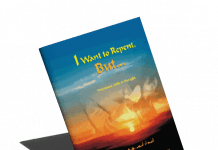Once the believer has remembered Allah and realized his sin, he is now obliged to turn to God in repentance immediately, without any hesitation or delay if he sincerely wants to repent. The postponement of Tawbah is the result of either a deliberate desire to prolong the illicit pleasure derived from the sin, or doubt on the part of an ignorant sinner whether or not Allah would accept repentance from him. In the first case the sinner has compounded his sin and should seek forgiveness for his delay while in the second case he needs to be informed that no sin is too great for Allah to forgive if he earnestly repents. Allah has emphasized the need for a quick response to sin in the following Qur’anic verses: “Surely Allah will forgive those who do sins in ignorance and soon turn in repentance. These Allah will forgive, for Allah is all-Knowing, all-Wise” (Soorah an-Nisaa 4:17. See also Soorah Aal Imraan 3:135). “Hasten in the race for forgiveness from your Lord” (Soorah Aal Imraan 3:133).
The longer one delays the Tawbah the more difficult it will become to do so, because the sin will have a greater opportunity to take root in the heart, and the desires will be given a bigger chance to rationalize the sin and overcome the conscience. In most cases a sin may be identified immediately based on the God-given awareness of good and evil with which each soul was created. This reality has been clearly stated by Allah in the Final Revelation:“By the soul and the One who proportioned it, then inspired it to wrong and right”(Soorah ash-Shams 91:7-8).
 The Prophet (Peace be upon him) further elaborated on this principle in his teachings. An-Nawwas ibn Sam’aan reported that Allah’s Messenger (Peace be upon him) said “Righteousness is good character and sin is what wavers in your soul and about which you would not like people to discover”
The Prophet (Peace be upon him) further elaborated on this principle in his teachings. An-Nawwas ibn Sam’aan reported that Allah’s Messenger (Peace be upon him) said “Righteousness is good character and sin is what wavers in your soul and about which you would not like people to discover”
(Sahih Muslim vol.4 p.1358 no. 6195 and at-Tirmidhee. See also An-Nawawi’s Forty Hadith, pp.90-1 no.27).
On another occasion Waabisah ibn Ma’bad said “I came to Allah’s Messenger (Peace be upon him) and he said “Have you come to ask about righteousness?’ I said ‘Yes’. He said ‘Consult your heart. Righteousness is what the soul and heart feel at ease with, and sin is what wavers in the soul and the heart even though people give you a ruling in favour of it, again and again’.”[1].
And based on this principle the Prophet (Peace be upon him) further advised his followers to avoid the doubtful. Al-Hasan ibn Alee related that he memorized the following statement from Allah’s Messenger (Peace be upon him) “Leave the doubtful for that which is not”[2].
 There is really no excuse for deferring Tawbah to a later date, especially considering the uncertainty of the future, which Allah so often emphasizes in the Qur’an: “No soul knows what it will earn tomorrow nor does it know in what part of the earth it will die”(Soorah Luqmaan 31:34).
There is really no excuse for deferring Tawbah to a later date, especially considering the uncertainty of the future, which Allah so often emphasizes in the Qur’an: “No soul knows what it will earn tomorrow nor does it know in what part of the earth it will die”(Soorah Luqmaan 31:34).
Consequently the believer who is sincerely seeking God’s pardon will not delay in the least, but will turn to the Oft-Forgiving Creator as soon as he realizes that he has fallen into sin. The speed at which he turns back to Allah will be a measure of his sincerity and the level of his faith.
[1] Collected by Ahmad and ad-Daarimee. It has been authenticated by al-Albaanee in his authentication of Mishkaah al-Masaabeeh (Beirut: al-Maktab al-Islaamee, 2nd ed., 1979), vol.2 p.845 no.2774 ftn.3. See also An-Nawawi’s Forty Hadith, pp.40-4 no.27.
[2] Collected by an-Nasaa’ee and at-Tirmidhee and authenticated by al-Albaanee in Saheeh Sunan at-Tirmidhee vol.2 p.309 no.2045. See also An-Nawawi’s Forty Hadith, pp.52-3 no.11. from the touch of Satan because they say ‘Trade is just like interest’.” (Soorah al-Baqarah 2:275). Trade and interest do have similarities but the harm to society in their differences is enough that Allah has made trade allowable and interest not. In fact, all prohibited things share similarities with their counterparts among the permissible things. In the same way that beef is similar to pork and grape juice is similar to wine but one is permitted by God for consumption and the other is not. Thus the essence of the issue is not our individual perceptions of what is beneficial and harmful, but what Allah, the Creator of all things, knows to be more harmful than beneficial. Allah then continues to exhort the believers to repent and abandon the sin totally: “O believers! Fear Allah and give up the remaining interest if you truly believe. If you do not, war has been declared on you by Allah and His Messenger. But if you repent, the capital of your wealth is yours. Do not be unjust and you will not be dealt with unjustly” (Soorah al-Baqarah 2:278-9).






